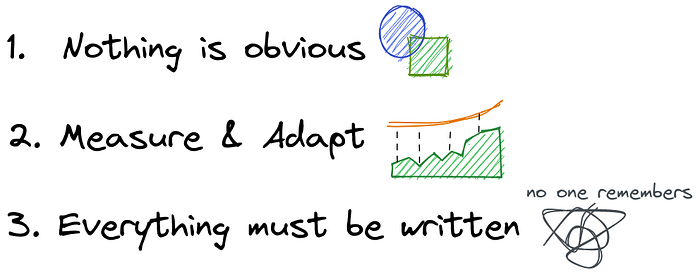The Magic of Setting Expectations
How to use expectations as a tool for growth and excellence

How many times have you reached a performance evaluation, or a retrospective and noticed the following phrases?
- “Why didn’t you help John (a junior developer) with the onboarding?”
- “Based on your experience, I was expecting you will take responsibility on that part”
- “I didn’t see any growth in that area, thus you won’t get the promotion”
If you would like to avoid this situation, there is a powerful tool called expectations, the key is to set them up, loud and clear, upfront.
No, it’s not obvious

Something happen in your team, it might be a task that fell between the cracks or a team member who didn’t take ownership. You might find yourself saying “I thought it’s obvious that X will be done”. Many things that seem obvious to you, might not be obvious to your team.
People are coming from different backgrounds, life, and work experiences that shaped their expectations. It’s very likely that for someone who worked a few years in an empowered team, it will be obvious that the team can influence product decisions, but for another team member it might be the first time. As their manager, it’s your responsibility to ensure people know what is expected from them.
A tool for measurement
Without expectations it’s very difficult to benchmark yourself, that’s why many people aren’t able to grow at their desired pace. By setting expectations your team members will be able to see the direction and work in iterable mode.
On the left, you can see growth progress on a person without expectations, their manager assumes they know their value. On the right, the manager kept setting expectations and worked on adapting them with the growth.

- I’m expecting you to be more independent
- I’m expecting you to lead this project
- I’m expecting you to own the communication outside of the team
- I’m expecting you to coach our juniors
- …
Write or forget
Having unclear expectations is much worse than having no expectations, thus it is very critical that expectations will be written. Many times I hear managers grumble that they did set expectations but the team wasn’t able to meet them.

When you try to analyze what went wrong, you realize that these expectations were not written anywhere, they were set in a meeting at best or a coffee chat at worst. I do understand that for some people is much easier to express their thought in verbal communication, but… if it’s not written it will be forgotten, or changed (which is even worse).
The process needs to be simple, you think about an expectation, you first write it down, then think about it a bit more, after you made sure it’s clear you either send it written or verbal communication. You should always get some minimal feedback from your member, it’s for making sure they understood and for adapting it to their reality.

- A need emerge
- You think of an expected outcome
- Formulate the thought into text
- Communicate async or sync
- Get feedback and improve
- Save and document
Some practical use cases
Performance excellence 🏁
Your team is working on a new initiative, it might be a new feature or a refactoring activity. As the leader of the team, you are sure your team will deliver the best results, I mean it’s obvious 😉
This might be less obvious to your team, by having a written page of the final expectation will help the team to figure out how to plan and validate their outputs. Besides that, the team would be able to get feedback on their work and improve for next time.
Personal growth 🐤
One of your senior team members seems to be working in isolation, you notice that junior members are not improving their skills and the team is not growing.
Your senior team member is likely aware that one of their responsibilities is to coach and mentor their fellow junior members. In your next one-on-one, let them know that you expect them to work together with others, even at the cost of tasks.
Team culture 🎮
Things seem to go in the right direction for your team. You managed to deliver challenging activities with great results, but you start noticing that many people are becoming toxic. Many sessions are ending with bad taste.
This is a substantial issue, it won't be solved by itself. One of the first actions you must do is to declare how do you expect team members to communicate with each other. Important to mention, this is only the starting point but it will provide the team a way to measure if things are going in the right way.
So let’s recap,


